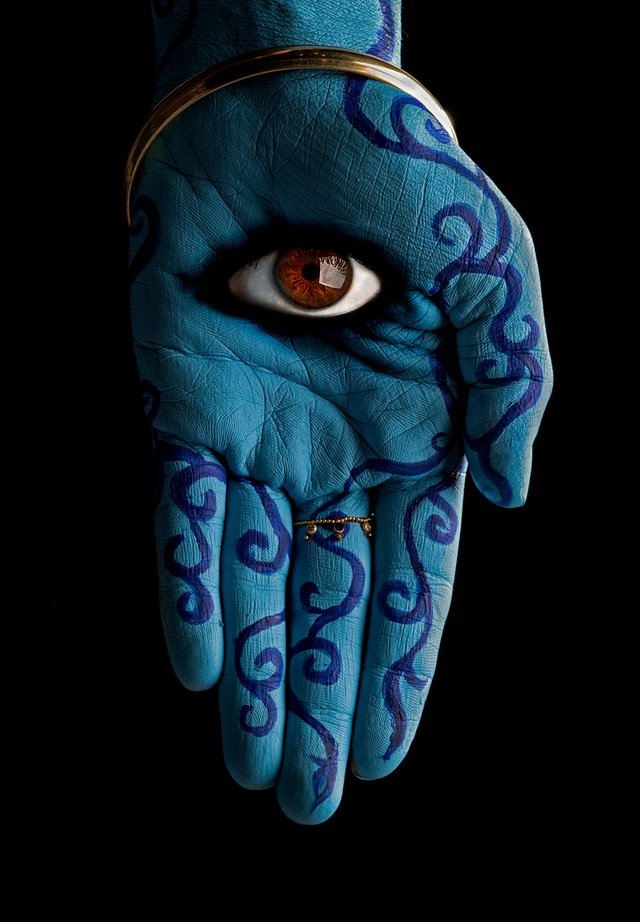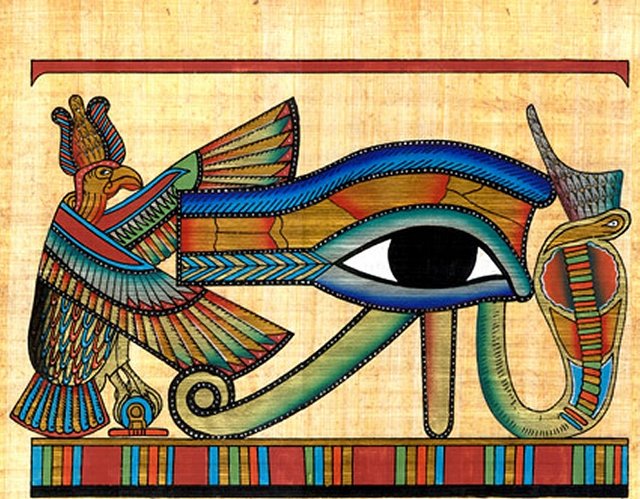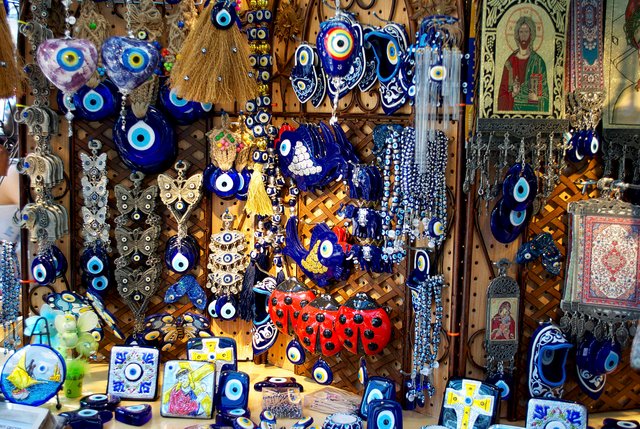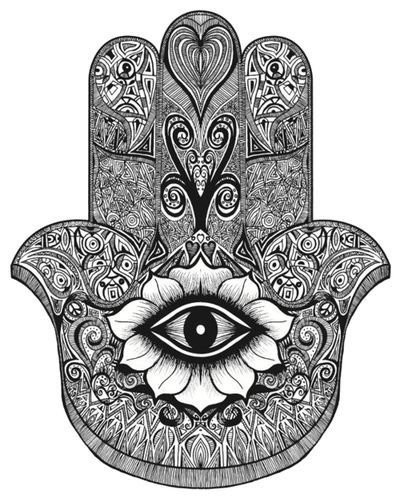The Evil Eye in Egypt & Around the World

The Global Mythology of the Evil Eye
Envy is as old as desire, and belief in the evil eye has probably been around just as long. Also called the “envious eye,” the old British term for the evil eye is “overlooking” suggesting that to admire an object of desire overlong, is to do it harm. In Hebrew it is called ayin ha’ra, in Italian mal occhio and in Spanish simply el ojo (the eye). While the notion of the evil eye is pre-religious, it is sanctified by the monotheistic religions, with some mention of it in the three holy books. A verse in the Qur’an is an explicit appeal to God for protection [113:1-5]: “I seek refuge in the Lord of daybreak… From the evils of the envious when they envy.” In contemporary Egypt, belief in the envious eye cuts across classes. Somewhere at the busy crossroads of culture and religion, this vestigial belief in magic continues to enjoy a broad currency.
If mind over matter is the mantra of the empirical, then spirit over matter is that of the irrational or spiritual, depending where you fall on the belief spectrum. Some perceive the air as dense with stray spirits, and believe the spirit world to be the invisible double of the apparent world. Within this worldview, there are those considered more receptive to negative energies, and euphemistically referred to as possessing eineen midawarra, or round eyes. In most cases, these unfortunates transmit the evil eye unwittingly, and are not regarded as bad people per se.
“Only something supernatural can express the supernatural,” pronounces Wittgenstein. And in much the same way, these maladies of the spirit are not diagnosed by men of science. A medicinal antidote won’t do for this otherworldly poison, so only those versed in these arcane arts may prescribe a remedy to undo or avert evil eye contamination.

Children, perhaps unsurprisingly, are considered most susceptible to the evil eye, with the least developed immune systems to fend off such harmful energies. To protect kids, voodoo-like paper dolls may be repeatedly pierced and burnt, with the ashes smeared all over the bewildered child, or newborns may be given unattractive nicknames, and declared ugly, to deflect the evil eye. Likewise, baby boys — the coveted sex — maybe dressed as girls for the first two years of their lives. (Which helps explain why my conservative grandfather, from macho Upper Egypt, had both his ears pierced).
But, it’s not just children who are at risk. Any good fortune: wealth, good health, relations with family and loved ones, or even a boon such as a new possession, is not safe. Which is why if you compliment someone about their new shoes, they will reflexively offer them to you. Or if you should happen to pass someone enjoying a quiet meal they will automatically ask you to join them, since according to a proverb: He who eats alone, chokes (Elly yakoll liwahdoo yizwar).
Greater good fortune, like getting a promotion, getting married or passing an exam requires greater sacrifices at the altar of the ubiquitous evil eye. Depending on your budget, that could mean anything from slaughtering a calf and sharing it with the poor, to throwing a lavish party for well-off but less fortunate friends, or distributing free sweets and cold drinks to your neighbors.
As a precautionary measure, for example, beautiful girls and/or healthy boys will periodically be blessed, with chants and incense, by the elders of their families. The definition of good fortune even extends to being in a good mood; so that if someone forgets themselves long enough for a good laugh, they hastily mutter: May everything turn out all right, God-willing (Kheir Allaho maga’aloo kheir).

Another strategy is simply to play down your good fortune. So that say, if someone asks you how you’re doing, you might sigh and suggest you’re just scraping by when in fact things are going quite well. According to another proverb, complaining is one way of avoiding the unwanted attentions of the envious: “a complaint is preferable to 100 blessings [against the evil eye]” (Shakwah bi meet ra’wah). By the same token, if you’re expecting something, or embarking on a new endeavor — travel, business, romance — one is advised to keep quiet, or “cover your candle if you wish for it to light.” (Another injunction against the evil winds of “overlooking.”)
On a daily basis, most of the 20 million Cairenes are exposed to a fantasy version of a city they cannot participate in, through provocative society pages in glossy magazines or popular youth films flaunting a privileged lifestyle. Given these circumstances — the appalling gulf between those who have too much and those who don’t have enough — it’s a miracle there isn’t more rancor.
What remains is a paradox: a people downplaying their good fortune (to shield it from envy) out of one side of their mouth and noisily thankful out of the other side for what little they do possess, lest they seem ungrateful. And they will remind you, no matter how pitiable their situation, that God created us of different stations in order to better serve one another. Or, in the shrewd wording of yet another proverb: He who looks up, tires. The result is a people disproportionately afraid of envy and yet, to an astonishing degree, remarkably free of it.
© Yahia Lababidi
My article appears in Bidoun magazine: https://bidoun.org/articles/he-who-eats-alone-chokes

(Image of eye on hand: timosaby.deviantart.com
Ancient Egypt, papyrus: Alamy stock photo
Marketplace trinkets: Wikipedia commons
Tattoo: tattoodaze.com)
This is the first non-poetry post I read for you Yahia... Well explained and the narrative is very lucid, combining the cultural and religious dimensions of the evil eye. Way to go my friend. I loved the Egyptian colloquial phrases you planted in there... haven't used those in quite a while.
Oh, I've posted quite a few essays, long and short, dear @nuridin, just scroll back on my blog & you'll find many :) It's especially gratifying to hear you enjoyed this piece, as a fellow Egyptian! I miss hearing those colloquial phrases and know they must have special meaning for you, too. Be well
If i may ask, Yahia, what are your thoughts on the evil eye becoming such a commercial object, often re-purposed and integrated into consumerism and especially tourist culture?
Curious as to the thoughts on this from someone much more knowledgeable than i.
i was given one by a friend who visited Turkey when i was young. i was captivated by the design and what i perceived the symbol to be and wore it every day for a couple of years until it broke of wear and tear.
Thank you for providing more background on the symbols history and present culture, much enjoyed the read.
It's a fine question, dear @carmalain7. Frankly, I think it's human nature to appropriate, re-purpose and transform symbols to suit our needs (look at Christmas, and the commercial atrocity that has become).
Still, I believe that even in the worst case of consumerism or tourist culture (for example, the whirling dervishes in Egypt, which have more to do with Vegas than what Rumi intended) a germ of the original truth remains, in however diluted a form. Whether it is protection, in the case of the evil eye, or spiritual celebration, in the case of Christmas or Sufi dervishes, something of the purpose and power persists...
I hope this helps in some way to answer your question and thank you for stopping by for a read, my friend!
Great post! Are you familiar with the term Hamsa or Khamsa Wa Khamis? I learned about this, a way to protect and ward off the energies of the evil eye.
Haha, of course I am, @talea.monet, I'm Egyptian! The full term is Khamsa wa Khamayesa fee A'ane el Al A'diw (tricky to pronounce/spell out, I'm sorry) and it means Take Five in the Eye of the Enemy. This utterance is usually accompanied by sticking your hand out, palm open, to ward off the evil eye :)
(Here's a bit more info from good 'ole wiki: https://en.wikipedia.org/wiki/Hamsa)
Thanks, for reading! I'm glad you enjoyed it & it's good to hear you speak Arabic :)
Yes! I use this "Khamsa wa Khamis" to ward off evil, I wish I knew how to say the full utterance as you've put here! Shukraan for sharing, I know a bit of arabic but not as much as you 😊
Shukran to you, too, for the heart-warming Arabic :) Tickled to hear it, and may you always be protected _/|_
I'm glad I could make you laugh! This is a great post, I just realized the other tactic you speak of here, downplaying your blessings is something I've been doing a lot lately as well. I actually heard someone speak of something like this, basically saying any big plans you have or something that you're working on that you are really excited about, do not share it with others until it is done. In this way, you are protecting your plans from the doubts and negative thinking of others (or the evil eye of envy!) May you always be protected as well, keep up the wonderful posts, you're teaching many <3
Yes, Life (and others) don't like a show-off :) So, we don't tempt fate by speaking of things before they materialize... Thank you, for kind wishes and encouragement. <3
شكرا للمشاركة المميزة!
حصلت على تصويت من
@arabsteem curation trail !
و تم اختيار مقالتك ضمن مقالات يومية مختارة للنشر اليوم في مقالنا! :)
Excellent, thank you. I hope other members of @arabsteem will enjoy this, too, and maybe add to it their own examples :)
Mashallah great post
Kattar kheirak :) Thanks, for reading.